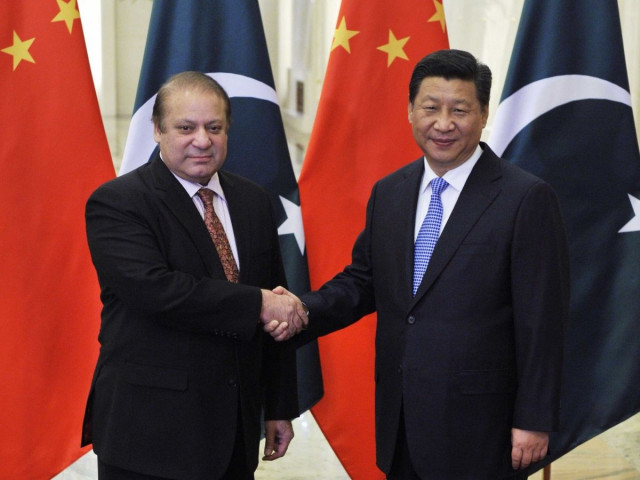China tells world to respect Pakistan’s sovereignty
Beijing remains opposed to India’s inclusion in NSG

Beijing remains opposed to India’s inclusion in NSG. PHOTO: AFP
“The international community should fully recognise that and respect Pakistan’s sovereignty and territorial integrity,” Hong Lei, China’s foreign ministry spokesperson, said on Thursday.
Pakistan hints at reassessing US ties
Afghan Taliban chief Mullah Akhtar Mansoor and his chauffeur were killed when the car they were travelling in was targeted in a US drone strike in Naushki district of Balochistan on May 21.
Following a huddle of senior civil and military officials, including Chief of Army Staff General Raheel Sharif and Prime Minister’s Adviser on Foreign Affairs Sartaj Aziz, Islamabad said that the drone strike was a clear violation of Pakistan’s sovereignty affecting mutual trust, and undermined the spirit of Afghan peace process.
Hong pointed out that Pakistan’s enormous efforts to combat terrorism and support the Afghan reconciliation process needs to be recognised by the international community.
Speaking about the impact of the drone strike on the four-nation Quadrilateral Coordination Group (QCG) which includes Pakistan Afghanistan, US and China, Lei said all stakeholders must work together.
“The QCG is formed to create enabling conditions for the Afghan reconciliation process. All relevant parties should pull together for that goal.”

China opposes India NSG entry
China is leading opposition to a push by the United States and other major powers for India to join the main club of countries controlling access to sensitive nuclear technology, diplomats said on Thursday as the group discussed India’s membership bid.
At the 48-nation Nuclear Suppliers Group (NSG) meeting in Vienna on Thursday, some countries opposed to India’s admission to the group appeared more willing to work towards a compromise.
The NSG aims to prevent the proliferation of nuclear weapons by restricting the sale of items that can be used to make those arms.
Incidentally, it was set up in response to India’s first nuclear tests in 1974.
However, India already enjoys most of the benefits of membership under a 2008 exemption to NSG rules granted to support its nuclear cooperation deal with Washington. The exemption was granted even though India has developed atomic weapons and never signed the nuclear Non-Proliferation Treaty (NPT), the main global arms control pact – a major condition for entering the group.
China on Thursday maintained its position that the NPT is central to the NSG, diplomats said.
Despite Beijing’s stance, a handful of other nations including South Africa, New Zealand and Turkey, have softened their stance somewhat, opening the door to a process under which non-NPT states such as India might join, diplomats said.
“There’s movement, including towards a process, but we’d have to see what that process would look like,” one diplomat said after the closed-door talks on Thursday aimed at preparing for an annual NSG plenary meeting in Seoul later this month.
Drone strike on Pakistani soil detrimental to relations with US: Army chief
Opponents argue that granting India membership would further undermine efforts to prevent proliferation and that if India is to be admitted, it should be under criteria that apply equally to all states rather than under a “tailor-made” solution for a US ally.
Pakistan, meanwhile, has responded to India’s membership bid with one of its own.
“By bringing India on board, it’s a slap in the face of the entire non-proliferation regime,” a diplomatic source from a country resisting India’s bid said on condition of anonymity.
Washington has been pressuring hold-outs. US Secretary of State John Kerry wrote to members asking them “not to block consensus on Indian admission to the NSG” in a letter seen by Reuters and dated Friday.
India plans to sell cruise missiles
India has stepped up efforts to sell its super-sonic cruise BrahMos missile system to Vietnam and has at least 15 more markets in its sights.
The government of Prime Minister Narendra Modi has ordered BrahMos Aerospace, a company co-owned by the Indian and Russian governments and produces the missiles, to accelerate sales to a list of five countries topped by Vietnam, according to a government note viewed by Reuters and previously unreported. “Talks are going on, there will be a deal,” said BrahMos Aerospace spokesperson Praveen Pathak.
Other potential buyers include Indonesia, South Africa, Chile and Brazil.
The BrahMos, reputed to be the world’s fastest cruise missile with a top speed of up to three times the speed of sound, has a range of 290 kilometres and can be fired from the land, sea and submarine. An air-launched version is under testing.
The unit cost of the missile, fitted on Indian naval ships, is estimated at around $3 million.
Published in The Express Tribune, June 10th, 2016.



















COMMENTS
Comments are moderated and generally will be posted if they are on-topic and not abusive.
For more information, please see our Comments FAQ